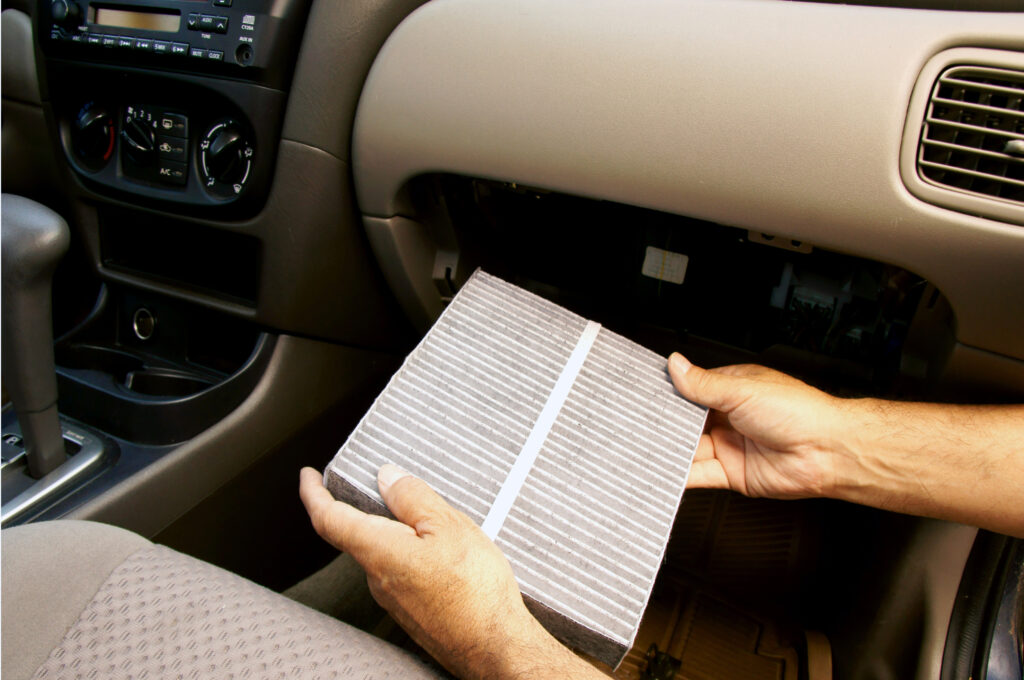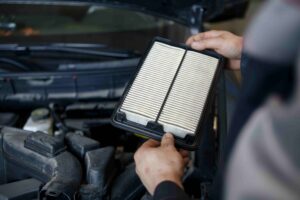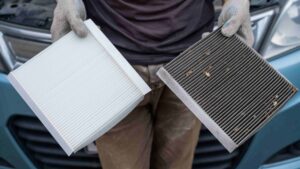What Is A Cabin Air Filter?
What Is A Cabin Air Filter? When it comes to car maintenance, some parts grab all the headlines. Like the engine, brakes, and tires. But nestled within the dashboard of your car is a part that plays a crucial role in your daily driving comfort. The cabin air filter. Most drivers might not give it much thought, yet this component is pivotal for both the health of the vehicle’s occupants and the overall air quality inside the car.
A cabin filter is a feature found in most modern vehicles designed to clean the air that enters the interior of the car through the heating, ventilation, and air conditioning system. It works to trap dust, pollen, and other airborne materials that can make riding in a car unpleasant or even unhealthy.
What Does A Cabin Air Filter Do
The primary function of the cabin air filter is to clean the air that enters the interior of your vehicle through the heating, ventilation, and air conditioning system. It traps dust, pollen, and other airborne material that can make the car ride unpleasant and unhealthy.
-
Enhances Air Quality.
By effectively filtering out airborne particles such as dust, pollen, soot, and other pollutants, the cabin air filter plays a crucial role in maintaining the cleanliness and freshness of the air inside your vehicle. This filtration process not only enhances the overall air quality but also contributes significantly to creating a healthier and more comfortable environment, especially for individuals who suffer from allergies or respiratory issues. Thus, ensuring that your cabin air filter is regularly inspected and replaced as needed not only improves the driving experience but also promotes better health and well-being for both you and your passengers.
-
Keeps the HVAC System Running Efficiently.
In addition to its role in enhancing air quality, a properly maintained cabin air filter plays a crucial role in optimizing the performance of your vehicle’s HVAC system. By efficiently filtering out contaminants such as dust, pollen, and pollutants, it ensures that the air circulating within your car remains clean and healthy. Moreover, a clean filter facilitates unimpeded airflow, allowing the HVAC system to operate at peak efficiency. Conversely, when the filter becomes clogged with debris over time, airflow can be significantly restricted, placing strain on the system and making it more challenging to regulate the interior temperature to your desired level. Therefore, regular inspection and replacement of the cabin air filter are essential maintenance tasks to ensure optimal performance and comfort within your vehicle.
-
Prevents Unwanted Odors.
Modern cabin air filters serve a dual purpose, not only capturing harmful pollutants but also effectively trapping unpleasant odors. Many of these filters go a step further by incorporating specialized materials like activated carbon or baking soda into their design. These additives act as powerful odor neutralizers, ensuring that your vehicle’s interior maintains a consistently fresh and pleasant atmosphere. So, whether it’s filtering out allergens or eliminating lingering smells, these advanced filters provide comprehensive protection and enhance the overall comfort of your driving experience.
-
Protects Upholstery and Dashboard.
By effectively filtering out sunlight-fading dust, pollen, and other airborne particulates, the cabin air filter serves a vital role in maintaining the overall interior quality of your vehicle. This essential component not only ensures a healthier breathing environment for passengers but also indirectly contributes to the protection of dashboard surfaces and upholstery from premature aging and wear. By preventing the accumulation of debris and contaminants, the cabin air filter helps sustain the aesthetic appeal and longevity of your vehicle’s interior, enhancing both comfort and resale value in the long run.

The general recommendation is to change your cabin air filter every 12,000 to 15,000 miles, but this can vary based on your driving environment. If you frequently drive in high-pollution areas or dusty rural roads, you might need to change it more often. Additionally, if you start noticing a decrease in airflow, increased noise from the HVAC system, or a persistent bad odor, these could be signs that your cabin air filter needs replacing.
How To Change A Cabin Air Filter
-
Locate the Filter.
Be sure to refer to the comprehensive instructions provided in your vehicle’s owner manual. This will give you precise details on where to locate the filter within your vehicle and the specific steps required to access it effectively, ensuring proper maintenance and optimal performance.
-
Remove the Old Filter.
Once you’ve identified the filter’s location within the system, the process of removing it typically entails releasing a cover or manipulating a few clips. This step is crucial for accessing the filter compartment, allowing for thorough cleaning or replacement as necessary.
-
Install the New Filter.
Once you’ve identified the filter’s location within the system, the process of removing it typically entails releasing a cover or manipulating a few clips. This step is crucial for accessing the filter compartment, allowing for thorough cleaning or replacement as necessary.
-
Dispose of the Old Filter Properly.
When it’s time to replace your old filter, ensure proper disposal by either placing it in the designated trash receptacle or, for a more environmentally friendly option, consider recycling it if local recycling facilities accept such items. By responsibly disposing of your old filter, you’re not only maintaining cleanliness but also contributing to sustainability efforts in your community.
Best Cabin Air Filter
it’s important to understand what a cabin air filter is and what it does. Cabin air filters are designed to trap dust, pollen, mold spores, and other airborne particles from entering the interior of your vehicle through the heating, ventilation, and air conditioning system. This helps improve the air quality inside the car, making your driving experience more comfortable and healthier, especially for those with allergies or respiratory issues.
- FRAM Fresh Breeze. Known for its high filtration efficiency and ability to neutralize odors, the FRAM Fresh Breeze Cabin Air Filter is a popular choice among car owners.
- Bosch HEPA Premium. Engineered with advanced filtration technology, the Bosch HEPA Premium Cabin Air Filter effectively captures dust, pollen, and other airborne particles, ensuring clean air inside your vehicle.
- K&N Cabin Air Filter. Made from washable and reusable cotton material, the K&N Cabin Air Filter offers long-lasting performance and superior airflow, making it an excellent choice for those looking for a sustainable option.
- Mann-Filter CUK 2939. The Mann-Filter CUK 2939 Cabin Air Filter features activated charcoal that effectively absorbs and neutralizes odors, in addition to trapping dust, pollen, and other airborne particles. Its high-quality construction ensures long-lasting performance and reliable air filtration.
- ACDelco GM Original Equipment. Manufactured to meet the stringent standards of General Motors vehicles, the ACDelco GM Original Equipment Cabin Air Filter provides excellent filtration efficiency and airflow for optimal cabin air quality. Its precise fit ensures compatibility and hassle-free installation.
Factors to Consider When Choosing a Cabin Air Filter
Compatibility
Notably, not all filters are universally compatible across different vehicle makes and models. Given the nuanced specifications inherent in automotive engineering, it’s imperative for car owners to meticulously inspect their vehicle’s owner’s manual or seek guidance from a qualified professional. This step ensures the precise selection of a compatible filter tailored to the specific requirements of your vehicle, optimizing air quality and maintaining optimal performance.
Filtration Efficiency
The effectiveness of a filter in capturing airborne particles is directly related to its filtration efficiency. To ensure maximum effectiveness, it’s advisable to seek out filters with a high-efficiency particulate air rating or those that adhere to the standards set by the original equipment manufacturer. This ensures optimal performance in trapping pollutants and allergens, thereby enhancing the air quality within your vehicle’s cabin for a healthier and more comfortable driving experience.
Material
Maintenance
When choosing a cabin air filter, it’s important to understand that there are different types available on the market. Some filters are designed to be disposable, meaning they are intended for one-time use and should be replaced regularly according to the manufacturer’s recommendations. On the other hand, there are reusable filters that can be cleaned and reinstalled, offering a more sustainable option.
The decision between disposable and reusable filters often comes down to personal preference and lifestyle factors. If convenience is a top priority for you, disposable filters may be the way to go, as they require minimal maintenance and can be easily replaced when needed.
Price
When considering, it’s important to recognize the diverse range of prices they come in, prompting the need to strike a balance between cost and quality. Although the allure of the most budget-friendly option might be strong, prioritizing a higher-quality filter can yield significant benefits. By opting for a premium filter, you not only enhance the air quality within your vehicle but also ensure prolonged efficiency and durability, thereby safeguarding both your health and the longevity of your vehicle’s HVAC system.






